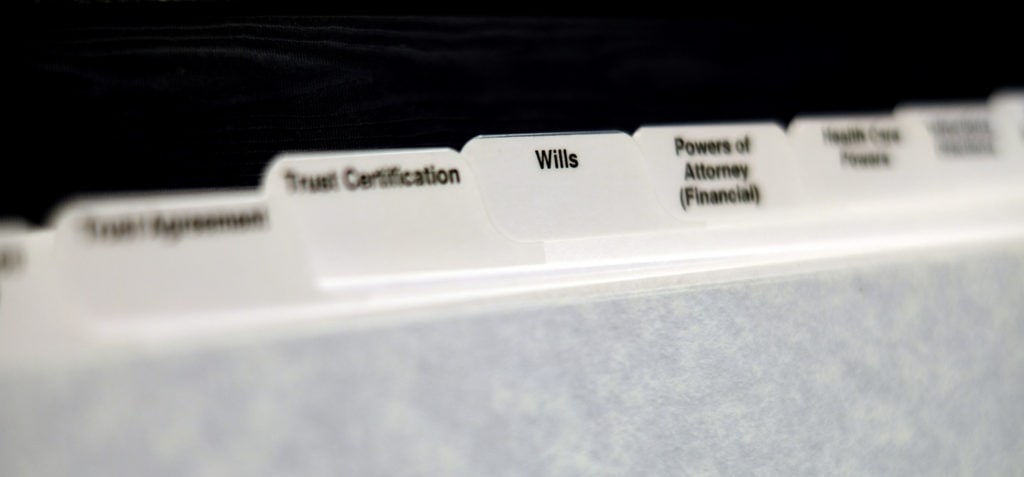Estate Planning Lawyers in Las Vegas
You can give your loved ones a gift by making an estate plan with and experienced estate planning attorney in Las Vegas. Having written records of your wishes enables those you trust to make decisions in difficult circumstances and when you cannot express them. Such trying moments are usually very emotional for your family, and an estate plan including wills and trusts can give them peace of mind.
A comprehensive estate plan helps your loved ones feel less stressed by eliminating any uncertainty about your preferences. And an experienced law firm can help you create a simple or complex estate plan to best suit your needs.
The Las Vegas estate planning lawyers at The Bourassa Law Group can help you to meet your specific needs and objectives to ensure estate plans are executed precisely as planned.
You can contact us at (800) 870-8910 to book your free consultation today.
Table of Contents
Why Hire an Estate Planning Lawyer?
There are many reasons to collaborate with an expert lawyer to prepare an estate plan. Unfortunately, many people need to pay more attention to this crucial process. Why is it important? Not having a formal estate plan for your home and other assets can cause uncertainty and arguments because life is unpredictable, and the sudden illness or death of a loved one causes emotions to run high.
The experienced estate planning lawyers at The Bourassa Law Group in Las Vegas can help with trusts, wills, and other estate planning issues, including Nevada asset protection trusts; they can assist whether you have been given the responsibility of managing your loved one’s assets or wish to plan for your own estate.
Expert estate planning lawyers can assist individuals and families in creating comprehensive estate plans; these plans are tailored to your particular assets, requirements and objectives. The attorneys will take the time to listen to you, offer advice, and lead you through the estate planning process to develop a set of individualized documents that you can depend on in the event of an emergency or death.
In a University of Cincinnati article called “For estate planning, the time to consider wealth transfer is now“, PNC advocates for three strategies when making a gift of generational wealth – Those include Reduce, Freeze, Replace – Our team of lawyers can help you solidify this plan.
How Our Lawyers Can Help You Create an Estate Plan?
Everyone can benefit from the essential legal documents in an estate plan. An estate plan can help you state who gets your belongings after your death, who should care for your minor children, how to manage assets if you are unable to do so, and disposition of your final remains, among other things. In Nevada, the law also provides for asset protection trusts, which are becoming increasingly popular as a strategy to safeguard your assets from creditors and protect your financial future. Estate plans provide your family with the knowledge and resources they need to respect your decisions for your health and wellbeing, and making the best use of your assets according to your wishes.
Without this roadmap, your disability, incapacity or death could unnecessarily lead to litigation, causing your friends and family stress and expense in taxes and legal fees. It can also lead to uncomfortable discussions and hours of wasted time trying to figure out what you would have wanted to happen in the event of your death or illness. With a bit of forethought and preparation, many frustrations can be avoided. You can be secure in knowing that your family members will know your wishes with respect to your assets and care, and that they will be honored in case of your death or disability. Estate planning helps to make the management of your assets as simple and quick as possible and gives you complete control over the distribution of your assets if you have a detailed estate plan.
Our estate planning lawyers will work closely with you to create an estate plan that can manage tricky family and financial issues and will find the best solution for your circumstances.

What is Estate Planning?
Estate planning allows people to design a strategy to safeguard the things they have invested so much effort to acquire.
To suit their needs and desires, individuals and families can opt to design a strategy for the benefit of close relatives, charitable organizations, or other beneficiaries. Tax planning is also an important component that can also make sure that your assets go to your beneficiaries instead of to Uncle Sam. And estate plans aren’t just for the elderly or people with terminal illnesses–anyone who wants to protect their loved ones, make sure their final wishes are known, and control how their assets are distributed must have an estate plan, no matter what age or state of health.
Nobody wants to think about their death or incapacity, and deciding to put off estate planning until later in one’s life is common. However, estate planning is for everyone! Life often results in unforeseen circumstances, even for young people. For example, what happens to your minor children if you pass away and don’t have an estate plan in place providing for them? Having a well-thought-out and legally enforceable estate plan can make a world of difference for you and your family members if tragedy occurs.
A comprehensive estate plan can be as straightforward or intricate as you like. Most estate plans consist of powers of attorney, a will or trust, and a living will or durable power of attorney that outlines your healthcare preferences.
People Who Can Benefit from Estate Planning in Las Vegas
Even though everyone can gain from an estate plan, some groups can benefit from it the most. Do not hesitate to contact the estate planning lawyers at The Bourassa Law Group if any of the following apply to you.
Parents of Young Children or Kids with Disabilities. By designating a legal guardian to look after your minor children in the event of your passing, an estate plan can help you prepare for the worst-case scenario if you have minor children. Additionally, you can utilize an estate plan to create a trust that will financially support your kids, releasing assets when they reach particular ages or milestones as you see fit.
Those with Substantial Assets. Without an estate plan, your possessions will be at the discretion of the legal system, and your family may quarrel over their ownership. With an estate plan, you can specify how your assets will be dispersed after your death, preventing unnecessary disputes and costs for your heirs. In addition, estate plans can provide for tax planning that can potentially shield your assets, protecting your legacy for the future.
Disabled Individuals. Estate planning can be complicated if you have a disability. But with proper planning, those with disabilities can structure an estate plan to allow continued access to critical government benefits. In the event that a disability renders you incapacitated and helpless, you might also need to designate someone to make financial and medical choices on your behalf. You can overcome these difficulties and ensure your future care with an estate plan.
Seniors. As you age, your estate plan should change as well. It can entail revising your healthcare preferences to reflect changes in your financial position, modifying your will to reflect those changes, or creating a trust to improve your eligibility for long-term care benefits.
A knowledgeable estate planning lawyer can assist you in making sure that your plan satisfies your current needs, whether you already have an estate plan in place or are just getting started.
How The Bourassa Law Group Can Help
No one can predict the future, but careful estate planning can help you prepare for any eventuality.
Our approach at The Bourassa Law Group is straightforward: We work hard to understand your individual objectives, values, and concerns before creating an estate plan that meets your needs now and will continue to do so in the future as you age. We want you always to stay one step ahead.
We create estate plans tailored to fit your specific needs. For example, maybe you need a trust if your goal is to skip the drawn-out Nevada probate procedure. In addition to being more flelxible than wills and helpful in avoiding probate, trusts can be utilized to safeguard wealth and lessen the impact of inheritance taxes. Perhaps you have a favorite charity, or a child with special needs. Your estate planning strategy may also include planning for gifts or the needs of a loved one. We’ll check your documents to ensure everything is included and planned for as you desire.
Contact the Las Vegas estate planning lawyers at The Bourassa Law Group now to prepare for the future. You can reach our Las Vegas Office at (702) 851-2180 to get help with your unique estate planning needs.
The Documents to Prepare For Comprehensive Estate Planning
Whatever your circumstances, having a thorough estate plan in place helps lower future financial and family risks. The items on the list below can be part of a comprehensive estate plan.
1. Wills
One of the simplest and best-known forms of estate planning is a will. A will is a legal document specifying the allocation of your property and assets when you die. A testamentary trust is a type of trust established by a will. You can use it to designate who you wish to care for your minor children, to help your family, friends, or persons with disabilities financially, and to manage the distribution of your assets after your passing.
2. Revocable Trusts
Revocable trusts help you designate not only who will receive your assets when you pass away, but also how they are to be managed if you become incapacitated for any reason. Trusts, when properly funded, also have the extra advantage of allowing you to avoid the cost and time required to go through the probate process, and eliminate the risk of will contests in the event that your heirs do not agree with your will. You can still use your assets while you are alive if you have a revocable trust and while you’re still living, you can use your possessions however you see fit. When establishing a revocable trust, most people also use a “pour-over will” as a backup to ensure that any assets unintentionally omitted from the trust are dispersed in accordance with the trust’s provisions.
3. Asset Protection Trusts
Nevada is one of the most popular states to set up an asset protection trust because of its favorable laws and regulations. An asset protection trust is a legal arrangement in which a person transfers ownership of their assets to a trustee, who is responsible for managing the assets and providing protection from creditors. The person creating the trust also appoints a beneficiary or beneficiaries who will receive the assets upon their death. Nevada asset protection trusts are advantageous because they are not subject to federal taxation and are also shielded from creditors. This means that creditors cannot access the assets held in the trust, which makes them a great way to protect your assets from potential creditors.
Beneath Nevada law any person competent to execute a will can create an asset protection trust (also known as a “spendthrift trust”) in real or personal property. 1 A “spendthrift trust” is a trust that directs a Trustee to provide for the maintenance and support of a beneficiary but, while the trust is in force, the beneficiary is prohibited from involuntarily or voluntarily transferring the trust property. Because the beneficiary cannot force the Trustee to transfer the trust property, the Trustee cannot be compelled to transfer the trust property to one of the beneficary’s creditors. In order to protect the beneficiary’s interest in a spendthrift trust, if a beneficiary attempts, or is forced, to transfer the property of a spendthrift trust, the Trustee is required by law to disregard and defeat every assignment or other act, whether voluntary or involuntary, that is contrary to the provisions of the Nevada Spendthrift Trust Act.
While many other states allow a Grantor to establish a trust for another beneficiary and protect the assets from that beneficiary’s creditors, Nevada allows a Grantor to establish a trust for the Grantor’s own benefit, and protect the assets from the Grantor’s own creditors. Nevada is one of a very few states which allow a Grantor to establish an asset protection trust, sometimes called a “self-settled trust” for the Grantor’s own benefit, as well as the benefit of the Grantor’s loved ones.
To protect the Grantor’s interest as a beneficiary of the trust from the Grantor’s creditors, a Nevada Asset Protection Trust (NAPT) must:
• be irrevocable
• it must not require any portion of the income or principal of the trust to be distributed to the Grantor
• it must not be intended to hinder, delay or defraud any known creditor; and
• at least one Trustee must be a Nevada resident or must be a bank or a trust company that has its office in Nevada.
One advantage that Nevada has over the other states that allow self-settled asset protection trusts is that the time when the assets transferred to the trust become protected from the Grantor’s creditors is among the shortest.
4. Powers Of Attorney
In your estate plan, you can designate someone with the legal ability to act on your behalf by establishing a financial power of attorney, a healthcare power of attorney, or both. It may be helpful if you become incapacitated and can no longer able to independently make financial or medical decisions for yourself. A power of attorney gives your spouse or other family member the ability to choose your medical treatment if you are hospitalized and unable to speak.
5. A Living Will
Using a living will, also known as an advance directive, you can spell out what your wishes are for your medical care should you be unable to express them or make decisions for yourself. This could include what types of life-sustaining efforts you would or would not want to be made, and decisions such as organ donation and end-of-life arrangements.

Estate Planning Documents We Can Help You Prepare
A significant step you can take to safeguard your family is to invest in creating an estate plan. It can take time to take the necessary actions to ensure that your estate plan is complete. An accomplished estate planning lawyer in Las Vegas can help you understand your alternatives and achieve your objectives to satisfy the requirements of all of your loved ones.
Working with an experienced estate planning attorney in Las Vegas, Nevada, to start your estate planning process is always recommended; our estate planning lawyers can help whether you need to modify an existing plan or develop a new one.
To achieve your objectives, our estate planning lawyers can create the following documents:
- Wills and Testamentary Trusts
- Powers Of Attorney
- Living Will
- Advanced Health Care Directives
- Revocable and Irrevocable Trusts
- Asset protection Trusts
- Pour-Over Wills
Additionally, our extensive estate planning consultancy covers the following areas:
- Asset Protection Planning
- Long-Term Planning
- Insurance Planning
How Much Does an Estate Planning Lawyer Cost?
The Estate planning process takes stock of everything you own and helps you with making decisions about what to do with it both during your working and retirement years and after you pass away.
The cost to have a lawyer assess your financial and family situation and draft the necessary documentation ranges from $100 (for a simple will) to $1,800 and can reach $2,000 to $3,500 or more, depending on difficulty, location, and other factors.
Some estate planning lawyers charge their clients per hour. The attorney’s geography, level of experience, and education will all affect the hourly rate.
Larger law firms typically have higher hourly rates than smaller ones. An estate planning attorney often charges $300 to $700 per hour. Estate planning litigation is also typically expensive due to the time involved.
The easiest way to determine your estate planning cost is to get a free consultation from one of the lawyers at The Bourassa Law Group.
Contact The Bourassa Law Group
Please get in touch with one of our knowledgeable lawyers to find out how a well-crafted estate plan can assist you and your family in protecting assets or addressing company issues and transitions. We can guide you through the procedure quickly and successfully.
Our estate planning services are often charged at a fixed rate, so you will always know the total cost. There will be no clock-watching and no big, unforeseen bills.
Call (800) 870-8910 to speak with one of our estate planning lawyers today.
Frequently Asked Questions
For more FAQ – Check out our BLOG on Estate Planning Wills and Trusts Frequently Asked Questions
1. What Is Estate Planning?
Estate planning is setting up activities to control a person’s asset base in the case of their disability and/or death. It includes determining how a person’s possessions will be protected, handled, and distributed in the event of death or disability.
2. What Activities Are Included in Estate Planning?
Arranging a will, establishing trusts, protecting assets from creditor, establishing charitable donations to save inheritance taxes, selecting an executor and beneficiaries, planning for your funeral and more are all planning activities.
3. How Much Does a Comprehensive Estate Plan Cost?
Because every estate plan has different requirements, estate plan expenses vary. A basic will can be created very affordably. However, a more intricate plan can cost you significantly more. Contact us today for more information! Quotes are free.





